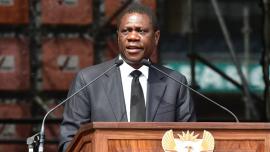
Deputy President Paul Mashatile has urged political parties that hold robust debates on social media to uphold ethical standards and refrain from unjust, deceptive or hateful speech, as many African countries head to the polls this year.
“We can run campaigns on social media without being malicious or degrading of both individuals and organisations,” he said on Tuesday.
The Deputy President was delivering a keynote address at the launch of the 'Principles and guidelines for the use of digital and social media in African elections' in Johannesburg.
“The reality is that the political environment during elections is tense and volatile, and we should use social media with responsibility to ensure that the content we share is credible and accurate.”
The new guidelines seek to create awareness among election management bodies (EMBs) on the benefits and threats of digital and social media to the electoral process and integrity.
They are a comprehensive framework for the continental EMBs adopted in Benin during the 11th General Assembly meeting of the Association of African Electoral Authorities (AAEA) last year.
The principles cover various areas - from the promotion of freedom of speech, access to information, protecting the rights to privacy and the role of the State, political parties, candidates and media.
For instance, one of the guidelines stipulates that political parties and candidates should ensure that campaigns conducted on digital and social media are transparent and attributed, including the use of paid-for-content and influencers.
The Deputy President has described these principles and guidelines as groundbreaking for Africa, spearheaded by the Electoral Commission of South Africa (IEC) on behalf of AAEA, as groundbreaking for Africa.
The launch coincides with heightened election activity around the continent, with over 20 African Union Member States, including South Africa, preparing for elections.
This, Mashatile said, provides an opportunity for fine-tuning the regulatory and operational protocols for the use of social media during these elections.
“We will, therefore, continue to uphold the right to free and fair elections in this election and thereafter, as we have done since 1994,” he vowed.
In the fast-paced digital world of today, he said it was important to recognise the important role that social media plays in shaping people's opinions and establishing the narratives propelled during elections.
“As we witness the increasing use of these platforms in political campaigns, it is imperative that we establish clear principles and guidelines to ensure a fair, transparent, and inclusive electoral process,” the Deputy President said.
Youth
He is of the view that social media platforms must be used constructively to inform and disseminate positive messages regarding elections, with a particular focus on the youth of Africa.
The youth, Mashatile said, are gaining significant grip on platforms such as Twitter, Instagram, Facebook and TikTok.
“We should, therefore, use these principles and guidelines to emphasise the importance of promoting online integrity, safeguarding against misinformation and disinformation, protecting privacy and data security, and fostering a level playing field for all candidates and political parties.”
Misinformation
Through adherence to these principles, Mashatile believes that countries will be able to safeguard the values of democracy through free and fair elections, and allow voters to make choices.
“We have a significant obligation to educate our population about the risks associated with disseminating misinformation, particularly concerning elections, since false claims can erode trust in the electoral process and provoke a wave of anti-voters and instability in our countries,” he said.
The Deputy President has described the misinformation and disinformation are a threat to democracy.
“They undermine confidence in our elections, and have the potential to suppress voter turnout.”
The Deputy President also took the time to express his gratitude to the agencies and digital companies for walking this journey with the African EMBs, offering them technical expertise, and building their capacities.
IEC Chairperson Mosotho Moepya told the delegates that the internet is here to stay and that it should be used for the common good.
“We’re working with those who own social media, authorities and EMBs, and we’re trying to find a way in which we can use social media to help us in the work that we do; and at the same time, to limit the damage it can do when it is abused.” – SAnews.gov.za


